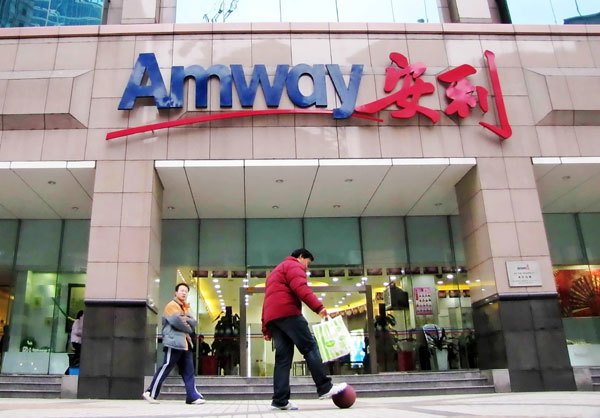Amway plots e-commerce expansion
|
An Amway store in Shanghai. China is Amway's largest market, with sales reaching 27.1 billion yuan ($4.31 billion) last year, accounting for more than a third of its global revenue of $11.3 billion. Jing Wei / for China Daily |
Online platform only used to ease management, logistics and branding
Amway Corp, the world's largest direct-selling company by sales, is to increase its e-commerce operations in China, according to its chairman and chief executive.
Speaking at a press briefing in Beijing, Doug DeVos said better use of e-commerce would enhance the company's operational efficiency and offer more support for distributors.
"While more and more companies are using e-commerce, I think we should follow the trend and we can get great help from it," he said.
China is Amway's largest market, with sales reaching 27.1 billion yuan ($4.31 billion) last year, accounting for more than a third of its global revenue of $11.3 billion - a record during the family-run business' 54-year history.
DeVos said the company views e-commerce as an opportunity instead of a challenge, and the company is working at various innovative ways of making best use of the most modern methods.
Specifically, he said that Amway in China is carrying out research and development, for instance, into traditional Chinese medicine-based healthcare products.
The company is investing heavily in advertising and branding.
Since last year, Amway has invested 600 million yuan in building a second China manufacturing base in Guangzhou, Guangdong province.
In line with China's direct-selling regulations, Amway uses a business model of combining direct sales and physical stores.
It now has more than 300,000 distributors and set up shop in more than 290 cities around the nation, selling 230-plus products under categories of health, beauty, personal care and home.
Direct selling - essentially a multi-level marketing model - has been under close scrutiny in China.
Amway launched in the Chinese market in 1995, but dedicated direct selling was banned in the country in 1998, and only a few recognized companies, including Amway, Avon and Mary Kay, were allowed to continue to operate, and then, only through a network of retail stores promoted by an independent sales force.
China introduced new direct selling laws in December 2005, and a year later Amway was one of the first companies to receive a license to resume direct sales.
However, the fortunes of the companies involved in the sector have varied.
According to Hu Yuanjiang, an independent analyst specifically focused on the direct-selling industry, Amway's success has been due to its innovation and consistency.
Its main rival Avon's global operational revenues dropped 5 percent to $10.7 billion year-on-year in 2012, and its China business contributed just 1 percent of that.
"Amway is diversifying its products and adding many new ones, such as water and air purifiers, while Avon only focuses on personal care and cosmetics," Hu added.
In accordance with Chinese regulations, direct-selling companies are not allowed to do e-business, so Amway can only use an e-commerce platform as a tool to facilitate internal management, logistics and branding, instead of as a sales channel, added Li Xiangdong, a retail analyst with Analysis International.
However, Li added that he remained skeptical about whether the company will be able to operate on both platforms without effectively competing against itself.
"If Amway can access a successful e-business model, that might create direct competition to its own direct-selling model," he added.
Gan Chee Eng, the president of Amway Greater China, insisted that the company would find a way to dovetail the two platforms.



















